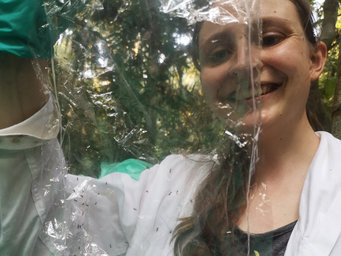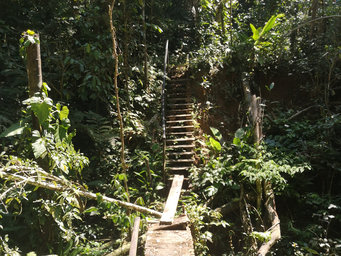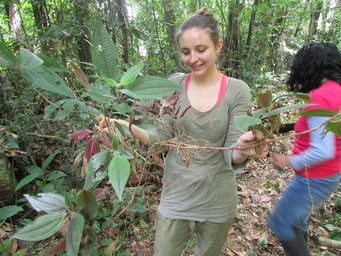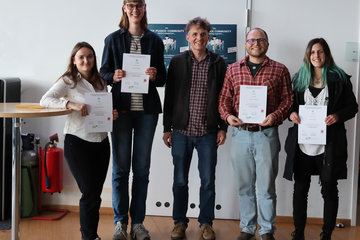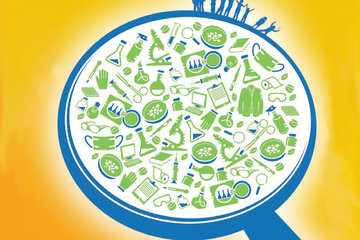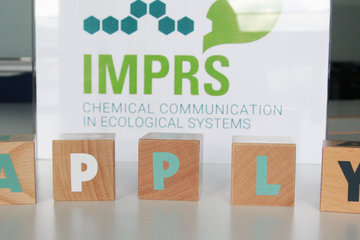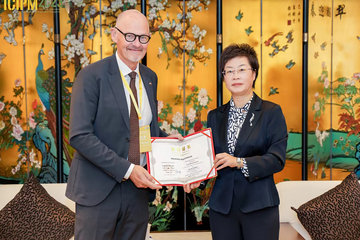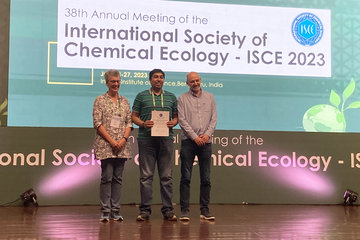Research on ant plants in the Peruvian jungle: how a doctoral researcher saved her research project during the pandemic
Andrea Müller from the Max Planck Institute for Chemical Ecology receives the Beutenberg Campus Award for the best doctoral thesis.

Andrea Müller's great curiosity and desire to understand how the world works led her to science. "I found it super exciting what organisms, and plants in particular, can do and how they interact with their environment. I wanted to find out more about this," she says, describing her enthusiasm for research. The ant plant Tococa quadrialata, which grows in a close symbiotic association with ants, became the subject of her doctorate. Both symbiotic partners, plant and ant, benefit from living together: While ants defend the plant against attackers, the plant provides the small insects with an accommodation and food. Andrea Müller wanted to find out whether these plants also use their own defense strategies that are independent of the ants, or whether these have become redundant due to the symbiosis with the ants. She investigated this question not only in the lab, but also directly where the Tococa plants grow in their natural habitat: in the jungle of the Amazon lowlands in south-eastern Peru. Solving logistical problems, such as bringing liquid nitrogen for freezing and transporting plant samples back from the rainforest, were the first hurdles that had to be overcome. However, the young doctoral researcher faced the biggest challenge when the Covid-19 pandemic suddenly turned all plans upside down: "I had just flown back to Peru when the lockdown made all further research activities on site impossible. I couldn't even get my samples from the lab. I waited six weeks in Peru for a return flight, while research was out of the question. The worst thing for me was that my entire project was suddenly on the brink."
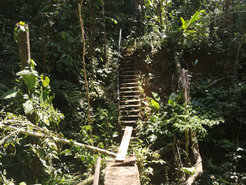
As soon as the borders reopened in 2021, Andrea Müller, whose research stay was funded by the German Academic Exchange Service (DAAD), returned to Peru. However, she was still in the midst of a pandemic, which made her research trip a real adventure. "The hostel where I normally stayed was closed. The paths in the jungle that led to my plants were weathered and overgrown," she recalls.
In the end, all the efforts paid off. Andrea Müller was able to conduct further experiments in the Peruvian jungle and show in her studies on the defense strategy of Tococa plants that ant plants benefit twice from the symbiosis with ants: through the protection offered by the ants and through the food waste and excretions of ants, which have a positive effect on the plant's metabolism. Despite the symbiosis with the ants, which have taken on the role of the plants’ bodyguards, the studied species Tococa quadrialata has not completely lost the ability to activate its own defense mechanisms in the course of evolution, even if they are less effective than the ants' protection.
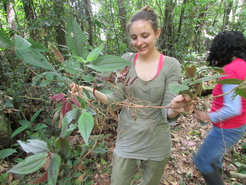
Andrea Müller discovered that two special plant defense substances are frequently found in the leaves of Tococa plants eaten by caterpillars: Phenylacetaldoxime (PAOx) and the corresponding glucoside (PAOx-Glc). She not only described the previously unknown PAOx-Glc for the first time and elucidated its biosynthetic pathway, she was also able to show its biological function as a defense substance, which surprisingly also occurs in many other plant species.
Last year, Andrea Müller successfully completed her doctorate. Her thesis on the "Physiological and phytochemical aspects of ant-plant mutualism" was awarded "summa cum laude". On May 30, 2024, she will also be awarded the Beutenberg Campus Award for the best doctoral thesis. Under the motto "Life Sciences meets Physics", this award particularly recognizes the use and establishment of physical measurement methods in the life sciences. "Andrea developed sensitive and reliable protocols for the collection of volatile organic compounds in the rainforest. To do this, she modified the chamber design and airflow of the odor collection devices to improve the recovery of volatiles. She also worked on a new, non-invasive detection system for plant defense reactions that uses specific fluorescent near-infrared polyphenol sensors. This technique enables the rapid quantification of plant defense substances and could be useful for future studies on the analysis of plant defense mechanisms," says her supervisor Axel Mithöfer, summarizing Andreas Müller's scientific achievement.
The young scientist has now left basic research behind and is working at the interface between production and quality assurance at a biotech company in Laupheim in Upper Swabia. She is delighted with the award, which brings her back to Jena, but also emphasizes: "Without all my colleagues here and in Peru, I wouldn't have been able to do all this. My project is an excellent example of what is possible with good interdisciplinary and international cooperation."
